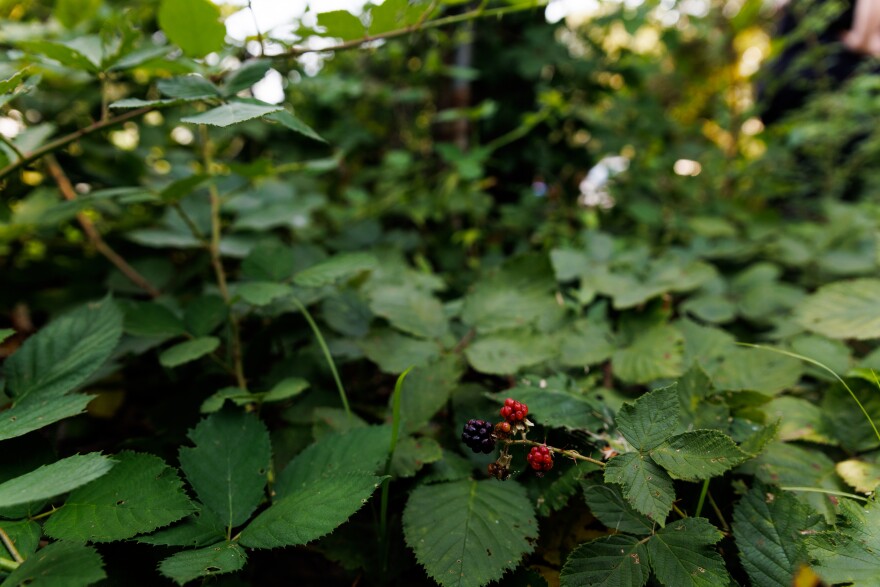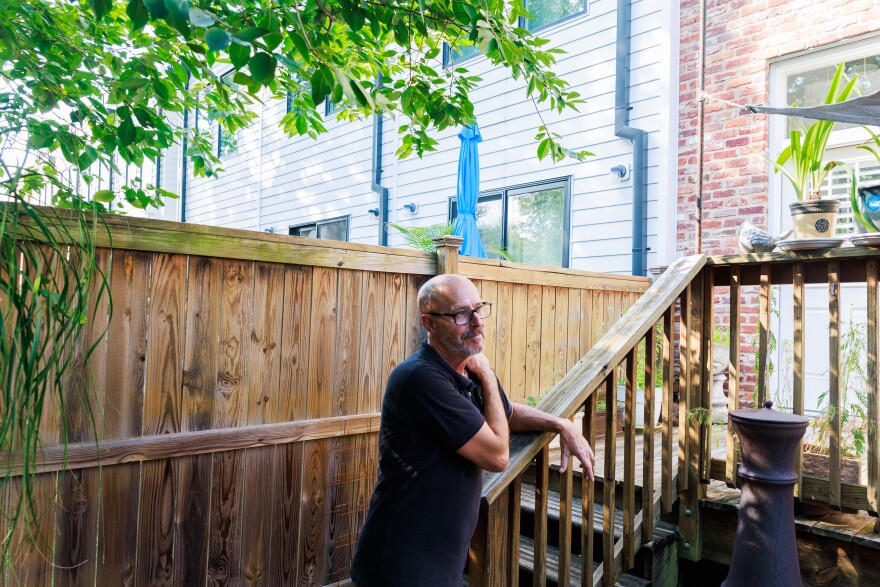Take a stroll in Richmond city streets, parks or the trails and you’ll come across something edible. But is it legal, or even ethical to pick it?
Whittney Evans with VPM News explores this question, as part of our new series Curious Commonwealth.
GM Keaton keeps an eye out for ripened fruit while walking their dog Lazslo through Richmond. Keaton is an artist and adjunct professor at Virginia Commonwealth University.
They’re also a bit of an amateur ecologist.
“We walk all the time,” Keaton says. “So, I feel like we get to watch a lot of different plants do their things.”
They’ve spent a lot of time getting to know each tree and plant they pass; whether it’s on public or private property; whether the fruit is ripe for harvest and other factors that play into a decision: to pick, or not to pick?
“There's a pomegranate tree. But it's not thriving here,” Keaton says. “And they're only producing so many fruits that I would not take the pomegranate.”
Keaton has a Google map pinned with trees and other plants that have sweet offerings.
“And the fig trees typically produce a lot of fruit so it doesn't feel as limited as the pomegranate,” they said.
Keaton’s pretty sure state law allows for harvesting fruit that grows on private property, but hangs over a public right of way. They say this while carefully circumnavigating sticky sidewalk jam beneath a mulberry tree.
“Like, if people are dodging your plant, it seems like fair game,” Keaton says.
Keaton isn’t alone in their street fruit fixation. There are apps and websites that track and map fruit trees in cities across the country. The website Falling Fruit, for instance, helps urban foragers track harvests and leave notes on their quality.

The other side of the fence
In Richmond’s Brookland Park neighborhood, Arly Ross’s back yard is listed on Falling Fruit as having a blackberry bush in the alley.
But she says she’s not too concerned with the tangled mess of vines out back or the people she says stop by to investigate.
Ross has got a bigger garden to tend to and graciously opens her back gate to reveal a smorgasbord.
There are vegetables and herbs in pots lining the fences and spilling out of a greenhouse: blueberries, tomatoes, grapefruit and an orange tree.
She offers up pretty much anything I can carry — and reiterates a familiar point.
“If my tree were overhanging, anything out in the public way you’re allowed to take,” Ross assures, noting she was curious about the law, not because she wanted to protect her own crops.
“No, not because of me, because I kept finding cherry trees, plum trees, all kinds of stuff all over the city,” she says.
Down the road in Church Hill, there are some grapes doing the exact thing Ross mentions. According to the fruit app, they’re growing out from someone’s private property, over the fence and are hanging above the sidewalk.
John Perry answers the door of the home whose fence is lined with grapevines. He says he did not put the vines on the falling fruit app: “My son may have. He may have. I didn’t.”
Perry says he usually invites people to help themselves. And then he directs them to a neighbor’s peach tree.
“I see the peaches on the sidewalk, they’re just falling off the tree,” he says. “There are so many on there right now.”

A fruity urban myth?
Whether it’s actually legal to take fruit from trees or vines on private property that hang in a public space is a murky topic.
Jennifer Freidel teaches agriculture law and environmental law at Virginia Tech. She couldn’t find anything in state law or Richmond's city code that addresses the issue directly.
“I also did a quick search to see if there had been any cases in Virginia about private property picking fruit from overhanging trees and I didn't find anything,” she says.
Virginia has what’s called a self-help law — which permits a property owner to trim a neighbor’s tree if its branches are causing a problem on their own property.
The law also makes clear that if the entire trunk is on the neighbor’s property, that landowner owns that tree and every part of it.
“And so, the fruit hanging on that tree is private property,” Freidel says.
Picking from trees on private property without permission is misdemeanor theft, and violators can be fined up to $500, according to state law.
But the bit about fruit hanging over sidewalks being fair game? It isn’t overtly mentioned anywhere.
VPM reached out to city hall to see if there was something Freidel or I had overlooked, but a city spokesperson did not respond before this story was published.
So, we asked someone else in Richmond who is close(ish) to the issue.
Kate Rivara coordinates the city’s community gardens. She couldn’t speak to the private-public question specifically — but brought up another important consideration.
What are the rules around harvesting community gardens?
She says there are about 22 registered community gardens in the city. Some of those have plots that are rented or assigned to individuals and families.
“But on the other hand, we have some gardens that are very much established for sharing,” she says. “And those ones people are encouraged to pick from.”
Foraging is allowed from all fruiting trees and shrubs in the community gardens, Rivara says. If they are reserved for the gardeners who tend that plot and should not be picked from, the plots are marked with numbers or names.
But in Sankofa Community Orchard and Fonticello Food Forest, for example, the public is encouraged to harvest enough for limited, personal use.
Rivara says she’s working to improve signage at community gardens to make expectations clearer - because it can get confusing.
“We’ve experienced some people coming in and really overharvesting at one of our gardens,” she says. “Everybody was really excited about fig season, which we’re in right now. Somebody came in and like, cleared off the whole tree. ... And so, we can only assume at that point that they brought it to their restaurant and made something for everybody with that volume. But they took more than they needed for their personal use — and then those gardeners didn’t get to eat any figs.”
Rivara brought up other ethical and environmental principles to consider.
It’s important to learn about what you’re picking. Make sure it’s edible, and also that it’s not the first or last fruit on the plant to ensure the population is robust enough to share.
“Have your friend try a pawpaw for the first time,” she says, “but also remember that there are other people and animals who want to eat this fruit.”
Stay on trails to avoid disturbing ecosystems and keep an eye out for herbicides.
“Taking in those surroundings and seeing — wait, do I see blue dye from sprayed herbicide? Or do I see a sign on the side of the trail that says ‘We’ve been treating here’? If you do, don’t pick that fruit because there’s some risk for you,” she says.
These are foraging principles you can and should bring to city streets, Rivara says. And she points out that while many property owners are fine with sharing, it’s still good practice to ask.
“And then you don’t have to have this strange feeling of guilt or shame running away with the figs, right? You actually made a connection,” Rivara says.
“And maybe that’s the gift that plant also gave you.”
This story was produced as part of the new VPM News series Curious Commonwealth.



